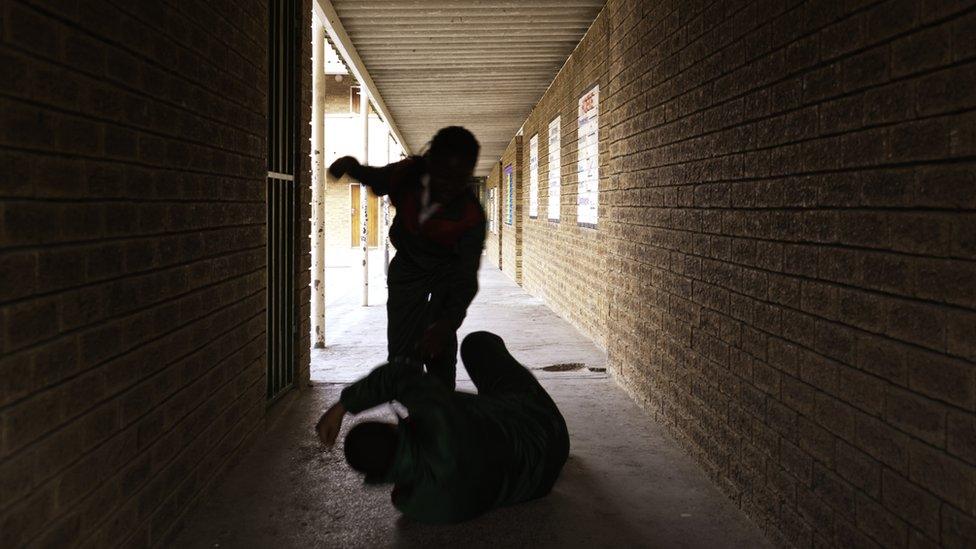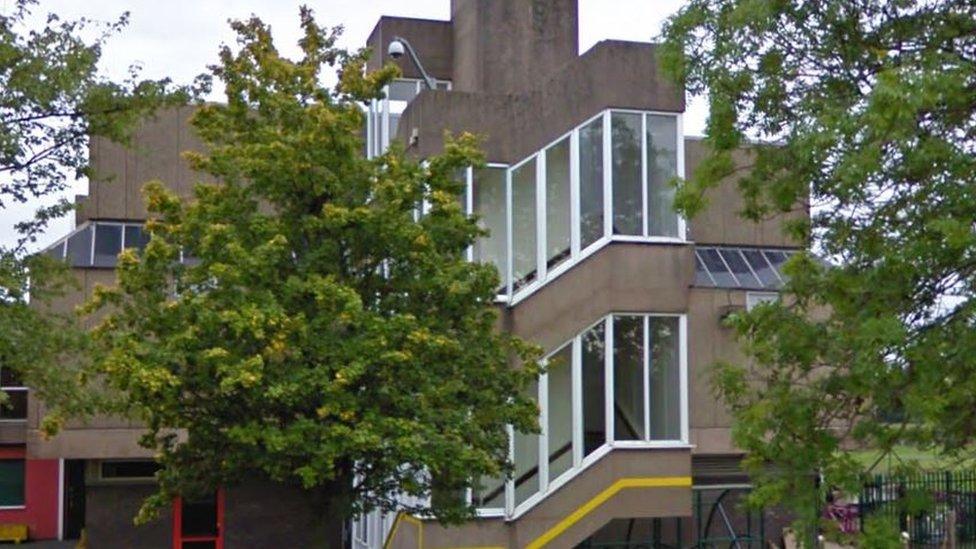Willenhall school 'riot' saw teacher injured by pupils
- Published

Bullying was 'rife' at the school, according to the former teacher (stock image)
Inspectors pelted with food, sixth formers intimidated by younger pupils and almost a third of children regularly absent. This was just some of the behaviour uncovered by Ofsted inspectors who rated Willenhall E-ACT Academy "inadequate" in every category. Here, one former teacher describes what it was like to work at the West Midlands school.
In the days leading up to one of the worst examples of behaviour I saw at Willenhall, tensions had been brewing for a few days because the weather hadn't been great.
Pupils had been repeatedly trying to sneak into the building during lunch time and were becoming more brazen.
Eventually it became more about winding staff up and exulting in defiance than actually entering the building. They were running from entrance to entrance trying to force their way in, while teams of staff manned doorways, physically barricading them - sometimes while the pupils pushed them.
Willenhall school pupils threw food at Ofsted inspectors
Strike at school where pupils threw food at inspectors
There was a near full-scale riot one day when pupils tried to force their way in. This meant staff spending their lunch break attempting to prevent doors being shoved open - and being physically pushed.
Windows were smashed and the fire alarm pulled. A colleague was injured on her shoulder in this event.
No support was forthcoming from senior staff despite emailing them and ATL [the 'attitude to learning' team ] throughout the fracas. A number of students were given fixed term exclusions but it had little impact.

Pupils were routinely disruptive in lessons (stock image)
Attempts to intimidate staff were fairly common.
I had pupils attempt to push me, threaten to throw chairs at me and threaten that their fathers would come to the school and assault me. Colleagues of mine were hit by doors, had doors pushed into their injured shoulders and were pushed.
Most lessons were also disrupted during my time at the school.
A considerable portion of pupils would routinely truant and walk around the school building avoiding their lessons. These pupils would bang on windows, shout, get into fights and disrupt lessons continually. When challenged, they would be threatening and verbally abusive.
If they attended lessons, they would generally just sit there and do nothing, or disrupt enough to be removed and then entertain themselves running around the school.
I can't quite describe the atmosphere of some classes. There was the steady, constantly increasing hum of pupils talking, as well as pupils throwing things around. Others would wander around while a teacher at the front of the classroom vainly attempted to restore order, an engaging, well-planned lesson sitting unloved on the projector.
This situation was ubiquitous in Willenhall.
But those more able classes were broadly well behaved, and I genuinely loved every minute of teaching the majority of my classes who were made up of those students who had a passion for learning.

A number of pupils would routinely truant, according to the teacher
However, the disruptive pupils' behaviour would have a big impact on class time and there were lessons in which nothing was done, literally nothing.
Bullying was rife. I had a very sobering day when a fantastic, hard-working, bright, polite, ambitious and witty girl was obviously distraught.
I spent lunch talking to her about the horrible bullying she was receiving from a group of older girls, and spoke to their form tutor and head of year in an attempt to address the problem. The girl was shocked - genuinely shocked - that anyone had taken the time.
But mainly, the more able pupils were scared, and bored, as they saw their lesson time disappear as teachers wasted their time on fire-fighting poor behaviour rather than helping them improve and reach their goals.
It sapped the magical combination of confidence and curiosity which makes young people thrive. They deserve so much better.
Like most people in my profession, I wanted to go into teaching because it was a graduate job that allowed me to be passionate about every day, whilst simultaneously make a tangible difference to the lives of others. In areas like Willenhall, a good school can be an engine for social mobility.
I had worked in "tough schools" throughout my training and I have strong behaviour management, so I was not overly concerned before starting. The school was initially extremely tough and challenging, but manageable - it took me around six months to establish myself there in the face of some shocking abuse.
But more common than active defiance and abuse were pupils who turned up, sat there and refused to engage whatsoever in lessons. As these were tacitly tolerated by the senior leadership team, this was difficult to challenge - blame was routinely passed to individual teachers for being insufficiently engaging.
Behaviour was awful but it was mainly due to low-level disruption - I felt unsupported but I did not feel unsafe.
During this year, in the face of incredible workload demands and the day-to-day battle of managing behaviour, I was diagnosed with depression and an anxiety disorder and went on anti-depressants.
A sobering moment in my teaching career was discussing this in the staff room only to have six of the seven teachers present explain that they too were on some form of medication for stress, anxiety, depression or related mental illness.
Action was taken to improve things, but the turnover in staff hamstrung this. I made the decision to leave, in part, because I was tired of not being valued as a professional, and knew I could do exactly the same job at any other school in Birmingham. I am now going to be taking up a head of department position at another school from next year.
With horrible conditions, patronising management and little career prospects, I was only there due to guilt and a sense of obligation towards my GCSE cohort.
I once again find teaching a joy and remember that I hold the best job in the world.

In a statement E-ACT said:
We fully recognise that there have been challenges at Willenhall E-ACT Academy, however, with the continued support of the trust across all aspects of the academy, we are confident that Willenhall will continue to make rapid progress so that we can offer the best possible education to our students.
The Ofsted report, external itself recognises that E-ACT has already begun to address the aspects of greatest concern, and we are absolutely committed to turning this academy around.
The trust will continue to strengthen leadership at Willenhall and ensure that senior staff have greater visible presence around the academy so that students are absolutely clear on expectations about their behaviour, and we have already invested in additional staff to support student behaviour outside of classrooms.
By working closely with academy staff we will ensure that further improvements in the quality of teaching and learning are secured through focussed reviews of the curriculum and classroom practice. We will also continue to work closely with parents and guardians who are being kept updated on every stage of progress.
At E-ACT we are proud of the fact that almost two thirds of our academies are rated at least Good by Ofsted, and we expect Willenhall E-ACT Academy to join this group by the time of their next full Ofsted inspection.

The former teacher, who the BBC has agreed not to identify, was speaking to BBC journalist Lisa Wright.
- Published27 June 2017

- Published12 May 2017
